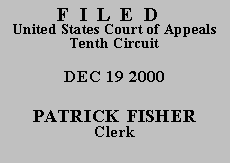

| ANDREW S. MAVROVICH,
v.
STATE OF KANSAS |
No. 00-3236
(D.C. No. 00-3187-DES) (D. Kan.) |
Because the Petition was filed after April 24, 1996, the effective date of the Antiterrorism and Effective Death Penalty Act ("AEDPA"), AEDPA's provisions apply to this case. See, e.g., Rogers v. Gibson, 173 F.3d 1278 (10th Cir. 1999) (citing Lindh v. Murphy, 521 U.S. 320 (1997)). Under the provisions of AEDPA, a state prisoner appealing a district court's denial of habeas relief under §2254 must obtain a COA before we may consider the merits of his claim. See 28 U.S.C. §2253(c)(1)(A), (B). A court may issue a COA "only if the applicant has made a substantial showing of a denial of a constitutional right." See 28 U.S.C. §2253(c)(3). Because the district court denied Petitioner's COA, we must first decide whether to issue Petitioner's requested COA before we may address his claims on the merits. See United States v. Simmonds, 111 F.3d 737, 740-41 (10th Cir. 1997).
After reviewing the record in this case, we have determined that Petitioner's request for a COA must be denied. Petitioner was involuntarily committed to a state mental institution in 1993 for a period of approximately 20 days, during which time he states he was wrongfully "convicted of being paranoid and delusionary." (See Petitioner's Motion in the Court of Appeals for an Order Authorizing the District Court to Consider a Second Application at ¶¶ 18, 27) ("Motion"). He was thereafter sentenced to approximately 80 additional days in the institution. (See id. at ¶28.) Petitioner was then discharged from the institution and is not currently in the custody of any state mental or penological institution. (See id. at ¶34; Petitioner's Opening Brief and Application for Certificate of Appealability at 10). Petitioner now argues that Kansas law grants him a right to a "return to competency hearing" in order to positively determine his mental status, and asserts that the state courts' failure to grant him such a hearing violates his rights under the Fifth and Fourteenth Amendments.
Kansas law allows an involuntarily committed patient in a state mental institution to request periodic hearings before a state district court judge to determine whether by clear and convincing evidence "the patient continues to be a mentally ill person subject to involuntary commitment for care and treatment." See Kan. Prob. Code Ann. §59-2969(f) (1999). The state court is instructed to order a patient released from the mental health institution if, during the course of the hearing, the court is not presented with clear and convincing evidence that the patient continues to be mentally ill. See id.(1) Although this appears to be the Kansas statute under which Petitioner now seeks redress, we note that it allows state court review of the legitimacy of an on-going involuntary commitment, but says nothing about the Petitioner's claimed entitlement to a "return to competency hearing" seven years after he was discharged from the state facility. In any event, Petitioner's claimed failure of the State to hold such a hearing does not raise a "substantial showing of a denial of a constitutional right" as required for the issuance of a COA pursuant to 28 U.S.C. §2253(c)(3).
Additionally, we note that 28 U.S.C. §2254 states that the federal courts "shall entertain an application for a writ of habeas corpus in behalf of a person in custody pursuant to a judgment of a State court only on the ground that he is in custody in violation of the Constitution or laws or treaties of the United States." See 28 U.S.C. §2254(b) (emphasis added). Petitioner is not currently "in custody pursuant to a judgment of a State court." In fact, he has apparently not been "in custody" by the State of Kansas for the past seven years. He is therefore not entitled to federal habeas relief in any event because he has not satisfied the custodial prerequisite necessary to confer jurisdiction under 28 U.S.C. 2254. See, e.g., Gonzales v. Stover, 575 F.2d 827 (10th Cir. 1978).(2)
For the foregoing reasons, we decline to issue a certificate of appealability in this case. This appeal is therefore DISMISSED.
ENTERED FOR THE COURT
David M. Ebel
Circuit Judge
*. After examining appellant's brief and the appellate record, this panel has determined unanimously that oral argument would not materially assist the determination of this appeal. See Fed. R. App. P. 34(a)(2) and 10th Cir. R. 34.1(G). The case is therefore ordered submitted without oral argument. This Order and Judgment is not binding precedent, except under the doctrines of law of the case, res judicata, and collateral estoppel. The court generally disfavors the citation of orders and judgments; nevertheless, an order and judgment may be cited under the terms and conditions of 10th Cir. R. 36.3.
1. An involuntarily committed patient may also be discharged by the head of the treatment facility where the patient is housed "when the patient is no longer in need of treatment." See Kan. Prob. Code Ann. §59-2973(a). It is unclear from the record whether Petitioner was discharged in 1993 by order of a state district court or by order of the head of the mental institution where he was being held.
2. Petitioner's claim that Kansas law allows him an unfettered right to file a habeas petition (see Petition at 10) fails for the same reason. See Kan. Prob. Code Ann. §59-2938 ("No person in custody under the provisions of this act shall be denied the right to apply for a writ of habeas corpus.") (emphasis added). Furthermore, the mere fact that Kansas law states that patients in state mental institutions "shall [not] be denied the right to apply for a writ of habeas corpus" does not obviate the jurisdictional requirements of 28 U.S.C. §2254.